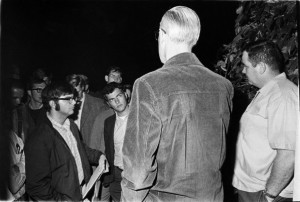Student Protests on the UO Campus: Demonstrations of the Late 1960s
A new exhibit, “Dissent and Defiance: Pacifists, Student Protesters, and Advocates for Economic Justice,” is now on display in the Paulson Reading Room in Special Collections and University Archives, on the second floor of Knight Library, through the winter term. In addition to conscientious objectors during World War II and the Occupy Eugene movement, the exhibit includes a look at student protests on the University of Oregon campus during the first year of Robert D. Clark’s tenure as president of the university. In conjunction with the exhibit, we dove into the archives to learn more about the tumultuous period of protest on the Eugene campus during the 1969-1970 academic year.
 Protestors primarily focused on what they perceived to be the university’s capitulation to American involvement in the Vietnam War. At a time when universities were dealing with the turbulence of student bodies that were becoming increasingly activist, students in Eugene increasingly focused their ire on one particular campus institution as the embodiment of Oregon’s acquiescence to the war effort – the Reserve Officers’ Training Corps, or ROTC, which had been established five decades earlier as a means of preparing an Oregon Battalion for World War I. As protestors homed in on the ROTC as the local representative of American policy in Southeast Asia, tensions heightened at the university. The charged atmosphere in Eugene set the scene for both non-violent protest events, as well as escalating violence. The University of Oregon witnessed sit-ins, arson, vandalism, and National Guard intervention during this period.
Protestors primarily focused on what they perceived to be the university’s capitulation to American involvement in the Vietnam War. At a time when universities were dealing with the turbulence of student bodies that were becoming increasingly activist, students in Eugene increasingly focused their ire on one particular campus institution as the embodiment of Oregon’s acquiescence to the war effort – the Reserve Officers’ Training Corps, or ROTC, which had been established five decades earlier as a means of preparing an Oregon Battalion for World War I. As protestors homed in on the ROTC as the local representative of American policy in Southeast Asia, tensions heightened at the university. The charged atmosphere in Eugene set the scene for both non-violent protest events, as well as escalating violence. The University of Oregon witnessed sit-ins, arson, vandalism, and National Guard intervention during this period.
By drafting procedures that afforded students their Constitutional rights and narrowly defined the rules of engagement for police intervention in campus affairs, President Clark and the UO administration limited violent actions on campus. Though arson and instances of vandalism also occurred during this turbulent year, and the National Guard appeared that spring on the Eugene campus, no fatalities or serious injuries resulted from protests on the UO campus. Clark’s willingness to engage in discussion with and protect the rights of student protestors thus kept the situation in Eugene from escalating to the point of another Kent State.

